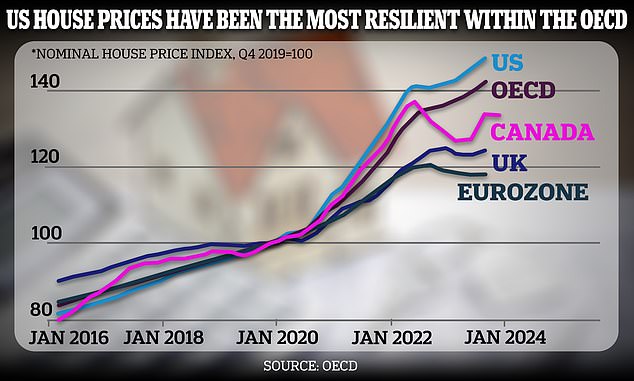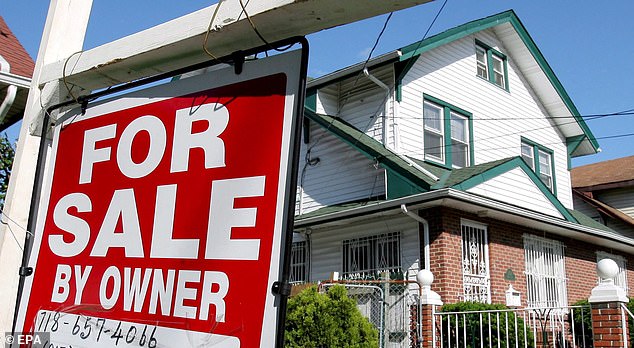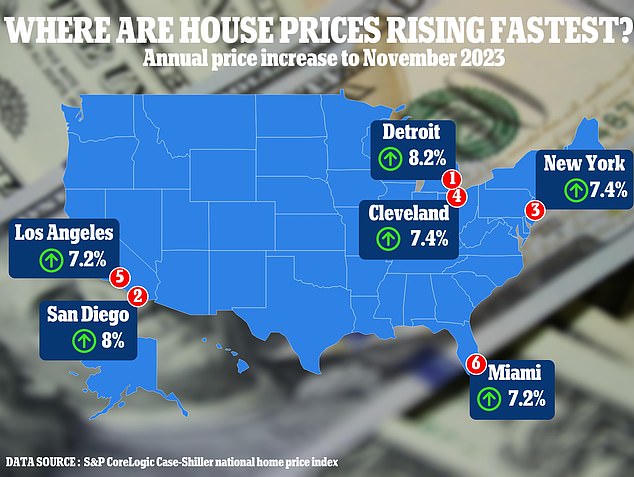- House prices in 37 OECD industrial countries increased in the third quarter of 2023
- It reversed a trend of stagnation in the first half of the year, according to FT
- House prices in the United States have been the most resilient among the 37 OECD countries.
<!–
<!–
<!– <!–
<!–
<!–
<!–
U.S. home prices are rising faster than any other industrial country after a post-pandemic slump, signaling a potential turning point in the market, according to a new report.
Global nominal house prices grew 2.1 percent in the third quarter of 2023 compared to the previous period, compared to almost zero growth in the first half of the year, according to a Financial times OECD data analysis.
In the 37 industrialized OECD countries, households Prices have held up better in the United States, where they rose 5.2 percent in the year through November, thanks to a strong economy and strong job growth, according to the analysis.
Home prices are “close to the bottom in many places and recovering in many places,” Tomasz Wieladek, an economist at investment firm T Rowe Price, told the outlet.
It follows a period of stagnant or falling house prices in many economies around the world, as most nations raised interest rates to combat inflation.



Across the 37 industrialized OECD countries, house prices have held up best in the United States, where they rose 5.2 percent in the year to November.
The Financial Times analysis noted that house prices are likely to continue falling further in a handful of countries with larger rental markets, including Germany, Denmark and Sweden.
In the United States and the United Kingdom, mortgage rates rose in February, dampening demand, but rates remain well below the highs reached last year.
The average rate on a 30-year fixed mortgage in the United States stands at 6.9 percent, down from 7.8 percent in November.
According to the S&P CoreLogic Case-Shiller National Home Price Index, prices in Detroit are rising at the fastest rate in the United States as the city recovers from the 2008 financial crisis, which left some homes virtually worthless.
In the year through November 2023, property prices in the Motor City rose 8.2 percent, according to the latest data from America’s leading housing price gauge.
Meanwhile, prices in San Diego rose 8 percent year over year, the second highest of any city.
Housing in New York City and Cleveland rose 7.4 percent annually, while property prices soared 7.2 percent through November 2023 in Los Angeles and Miami.


In the year through November 2023, home prices in Detroit rose 8.2 percent, according to the most recent data from the main measure of U.S. housing prices.
Figures separated from the National Association of Realtors (NAR) show existing property sales fell 19 percent last year to 4.09 million – their lowest level since 1995 – as rising mortgage rates and still-high prices curbed buyer demand.
However, economists say the market appears to be in much better shape by 2024.
During the pandemic, home prices soared from $329,000 in January 2020 to $433,000 two years later, according to U.S. Census data.
The market was boosted by the so-called “race for space”, in which buyers sought larger homes with more outdoor space to get through the lockdown.
But they have continued to grow since then thanks to a limited supply of available homes. NAR data shows that the median home price nationwide reached $382,600 in December, up 4.4 percent from 2022.

